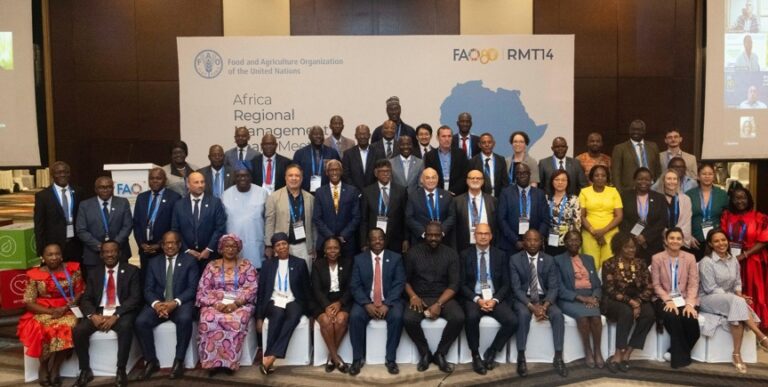|
Getting your Trinity Audio player ready...
|
The Food and Agriculture Organization of the United Nations (FAO) has opened its 14th Regional Management Team meeting in Accra, Ghana, bringing together more than 150 leaders and technical specialists from across Africa and FAO headquarters to discuss pressing issues shaping the future of the continent’s agrifood systems.
Under the theme Partnership. Innovation. Action. Learning, the meeting is focusing on strengthening partnerships, driving innovation, scaling up action, and enhancing learning across FAO’s work in Africa. Discussions align with FAO’s Strategic Framework 2022–31 and the Four Betters of better production, better nutrition, a better environment and a better life, leaving no one behind. The meeting comes at a critical time as Africa grapples with deepening food insecurity, the climate crisis, economic pressures and evolving partnerships.
The meeting falls during FAO’s 80th anniversary year, marking eight decades of work to end hunger and transform agrifood systems globally and in Africa.
Opening the three-day event, FAO Deputy Director-General Maurizio Martina said “Partnership, innovation, action, learning – these are deeply connected concepts. As we mark 80 years of FAO, this event enhances our efforts to tackle food security and nutrition challenges globally.”
Building on a legacy for the future of Africa
In his Keynote Address, FAO Assistant Director-General and Regional Representative for Africa Abebe Haile-Gabriel urged participants to harness the momentum FAO has built across the continent.
“Our theme – Partnership, Innovation, Action, Learning – can serve as a powerful guide defining the dynamic, forward-thinking approach we must embody to effectively serve our member states and achieve our shared goals,” he said. “Business-as-usual is simply insufficient. We must actively seek, pilot, adapt, and importantly, scale innovative solutions – technological, financial, programmatic, and policy innovations.”
Haile-Gabriel noted that despite complex challenges, FAO has seen commendable progress in Africa, citing deeper partnerships, increased resource mobilization, and growing regional influence. He highlighted the expansion of the Hand-in-Hand Initiative to 37 African countries, strengthened collaboration with the African Union, and impactful knowledge leadership across issues such as digital agriculture, social protection, and sustainable trade.
Honourable Deputy Minister of Food and Agriculture of Ghana, John Dumelo, said: “Ghana is honoured to serve as the host of the FAO Regional Office for Africa in our dynamic capital, Accra – a testament to the deep and enduring partnership between Ghana and FAO…Ghana is ready to walk side by side with FAO and all partners. Ready to lead and to learn. Ready to drive the transformation that will secure a resilient, inclusive, and prosperous agricultural future for our nation and for Africa.”
#RMT14 for Africa
Over three days, RMT14 will cover key issues including:
– analyzing progress under the FAO Strategic Framework 2022–31;
– enhancing partnerships and mobilizing resources for sustainable agrifood transformation;
– scaling up innovations to support food security, climate resilience, and rural development;
– aligning FAO’s regional work with Africa’s newly adopted Post-Malabo CAADP 2026–2035 Strategy;
– youth and women’s engagement and empowerment; and
– ensuring effectiveness in delivery, maintaining rigorous compliance, and delivering as One FAO.
Alongside the formal sessions, a special exhibition under the theme “FAO at 80: 365 Days of Action in Africa” is being held at the meeting venue, the Mövenpick Ambassador Hotel, showcasing FAO’s achievements on the continent since the organization’s founding in 1945 and looking towards the future.
#RMT14 participants include FAO Representatives from across Africa, Subregional Coordinators, technical experts, and senior leadership from FAO headquarters. Development partners and representatives from the African Union are also engaged.
As Africa’s food security challenges grow more complex, FAO is determined to adapt, innovate, and strengthen its impact on the ground.


